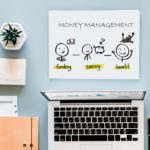1. Saying no
I’ve recently understood the power of a simple ‘no’, and drawing boundaries. Relationships formulated on trust and mutual understanding are the ones that take you forward. It is important to remind yourself of why you’re doing a certain job, or why you’d take on a certain client assignment. It needs to add value and not drain you out. There are times where you may choose to say no. Relationships that are trustworthy and strong will not get tarnished by this. Talking to another entrepreneur today, she said simply, “I can’t work with people that I don’t like”.
While this person has been in business for a while, and not every Startup founder can say that (especially when it’s a B2C business), it made me think. We spend a lot of energy trying to convince people of our ideas at times. Sometimes, it is indeed better to stay within the niches where people love our work and collaborate in a way that helps us stay more creative. Although this might sound like HR metric manipulation, it’s important to stay true to ourselves and say ‘no’ where we feel our ideas will get compromised in ways that we don’t like. After all, I thought, even when I am a founder and taking the big risk, why do I need the experiences of the usual 9-5 job where I can’t control it? I am a “yay-sayer”, but every now and then, saying ‘no’ is a good step to keep up my sanity. Here are some other things to help keep your sanity:

2. Walking in the forest
Shinrin-Yoku is a Japanese technique meaning forest bathing. Walking through nature clears up your head, relaxes you and makes you feel creative. Having done this for a 30 odd day period as a habit forming project, I can say this works. When I am dead tired or can’t think of anything creative, I go for a walk in the forest behind my house. And just walk till my legs feel the pressure. It’s a different me that comes back to the work-desk. There are plenty of such exercises to stay more energized and creative, and it’s been proven often that physical activity makes a huge difference to our lifestyles. Whether you go for a run, or a short walk, the point is to remain consistent and stick with something.
3. Keeping the phone away
My friend, and a startup CEO, told me this: “in a Startup, you are almost working 24/7. It’s hard to balance so many things with personal life. I love spending time with nature and without my phone at least for a couple of hours per week. I have learned that not carrying a phone in your free or personal time is always so much better. Otherwise you end up working and looking up different things about your work. Simple but an extremely valuable trick.”
I admit that I struggle with this one. Most times even while walking I carry my phone around to measure my steps. I need to really try hard on this one.
4. Meditating
I recently read an amazing post by Toby Ruckert, who has founded many Startups and is also an accomplished musician. Toby focused heavily on the merits of meditation. He says, “the triple and sometimes quadruple responsibilities of the different ventures I was involved in took a toll on my balance. Without learning meditation, I have no clue how I would have got through.
There was a period where I didn’t sleep.” On a personal level, while I’ve tried Yoga as a form, I have never actively meditated or learned how to do it from a teacher. Perhaps, I need to practice this form.
5. Finding your lost hobby
I love being creative. And the deep sense of no-time had depleted my energies somehow. I have been forcing myself to draw, paint, and sketch. I also try cooking my mom’s recipes these days to go away from the usual barrage of work and yet feel creative. Toby talks about this point as well, saying, “looking back, I can see that at the time I stopped doing two things that I usually enjoy, playing piano and cooking.”
Both are creative outlets, and in retrospect, I should have noticed that once I let those slip something was wrong. In fact, the sheer volume and diversity of the work I was doing required so much of my creative energy that it took up this reservoir completely. Despite not having any physical ailments, my mental capacity to create was becoming incapacitated.










